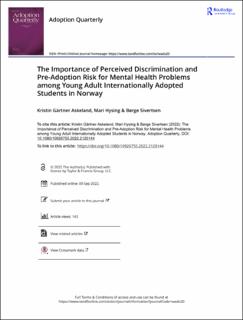The Importance of Perceived Discrimination and Pre-Adoption Risk for Mental Health Problems among Young Adult Internationally Adopted Students in Norway
Journal article, Peer reviewed
Published version

Åpne
Permanent lenke
https://hdl.handle.net/11250/3037312Utgivelsesdato
2022Metadata
Vis full innførselSamlinger
Sammendrag
The research on mental health problems in adult international adoptees is limited, and while perceived discrimination has been related to increased psychological distress, less is known about its influence on more severe mental health problems. The study investigated mental health problems and the importance of pre- and post-adoption risk factors among internationally adopted students in young adulthood. Data stem from the cross-sectional SHoT study (Students’ Health and Wellbeing Study) of students in higher education in Norway where 409 (0.8%) students identified themselves as internationally adopted. The internationally adopted students reported higher levels of psychological distress and higher occurrence of self-harm, thoughts of non-suicidal self-harm (NSSH), suicide attempts and suicidal ideation compared to their non-adopted peers. Perceived discrimination was associated with increased psychological distress, and higher odds of thoughts of self-harm and suicidal ideation. Being adopted from Asia was associated with lower odds of NSSH and suicide attempts compared to other birth continents. Age at adoption was not associated with any of the mental health outcomes. The results indicate an increased risk of mental health problems for internationally adopted students and suggests that pre- and post- adoption risk factors are associated with different mental health problems.
